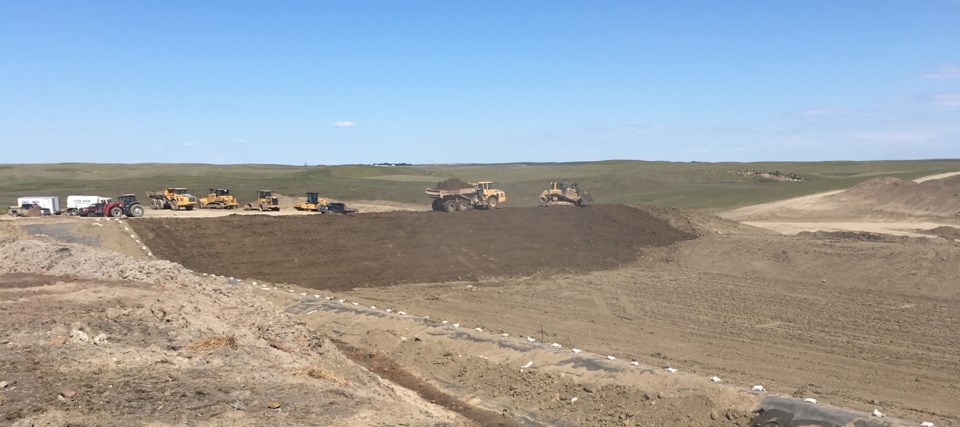Weyburn – Way out at the western edge of the southeast Saskatchewan oilfield, southwest of Lake Alma, is an industrial landfill known as GAP Disposal.
Chris LaBossiere, one of the partners in the company, explained, “Glenn Petterson founded the landfill in 2001. He sold it in 2003 to a company I was vice president of, Waste Services. We bought it. It was owned by them who was then acquired by Progressive Waste who was then acquired by Waste Â鶹´«Ă˝ions.”
He noted that the landfill wasn’t a fit for those owners, so Glenn Petterson and his son, Cory, who had been working at the landfill for 15 years, reached back to Chris and, together, they would buy it back and run it as a family-owned business.
LaBossiere said, “We just built a new cell. We spent almost a million dollars building another permitted landfill cell. We’ve probably got about 80 to 100 years worth of air there, but under construction, we now have about four years of space, which gives us lots of runway.”
The landfill is still serving southern Saskatchewan and northern Montana, he noted.
The facility is also relatively close to the Flat Lake play, which is in the Torquay and Oungre areas. Flat Lake is one of them most active plays in Saskatchewan’s oilpatch.
“It’s as busy at it’s ever been,” LaBossiere said. “It’s cyclical, knock on wood, so we don’t take anything for granted. You can have good and bad months and good and bad years.
“I think the difference between us, as owners, and bigger companies is we’re more patient. This is Glenn’s ninth oil show. He’s been there that long. We’re open seven days a week for people, if they need us to be. We’re open the next day, if you have a big spill. It’s different, when you’re working with the owners and operators at the same time,” LaBossiere said.
Does more regulation mean more business for them?
“I think so. It’s a double edge sword. We need to stay on top of regulations, so it increases costs, from our perspective. Our landfill is highly engineered, obviously. This new cell we built is engineered, compacted clay liner with a geo-synthetic liner on top of it, internalized leachate collection systems, and all that.
“That’s keeping us having to innovate, but it also drives volume into our site.
“Our goal is to look at different waste streams in and expand our geographic footprint, as much as we can. It’s tough. There’s lots of competition out there,” he said.
There are similar, competitive sites at Colgate and Heward. “Nobody’s going to be driving by those sites to get to our site. This business is about geography, but it’s also about service. We have a long-term provider of auto-fluff coming out of a scrap metal company in Regina – huge, huge volumes. Auto fluff is, when they shred up a car, it’s basically everything but the metal. You think about seats and plastics and metals, it all gets shredded into little pieces.”
They have a long-term contract, and their flexibility in receiving it is a big factor.
Glenn is still living near the site. “We’re still out there. We like what we do. We don’t figure on leaving.”
“We sold it in 2004, and I’ve been running it ever since. The opportunity to came up. The new company that amalgamated with us, we didn’t fit into their plans. We were small and not generating the kind of income they were used to. We decided we didn’t want anyone else around. We own all the land around it, so we bought it back. We wanted to have it go in a different direction. We have lots of different ideas we’d like to try.”
The ideas include the aforementioned new cell, as well as a leachate evaporation pond. That eliminates the need to haul leachate to disposal wells. “We’re going to put an aerator on that will kick in automatically,” he added.
LaBossiere said they’re also looking at a treatment pad.
“For us, we’re trying to play the long play. We might diversify into other services as well,” he added. “It will be what makes sense vertically. We want to service multi-markets.”
LaBossiere owns a waste collection company in Edmonton as well as a technology company called Yardstick. Last December it bought Danatec, which focuses on online training. Danatec was also an an exhibitor at the show.
“When you get to the face of the business, it’s always about service. If you stood at our scale shack and saw the drivers come in, it’s all about service, friendliness, timeliness, respecting their time, respecting their safety. It’s really about relationships, doing what you say you’re going to do,” he said.




